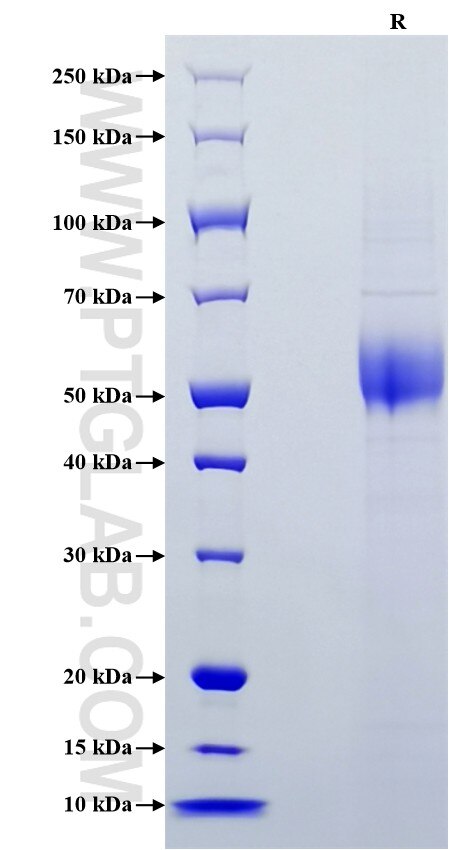Recombinant Mouse IL-1 RI protein (His Tag)
Species
Mouse
Purity
>90 %, SDS-PAGE
Tag
His Tag
Activity
not tested
Cat no : Eg1158
Validation Data Gallery
Product Information
| Purity | >90 %, SDS-PAGE |
| Endotoxin | <1.0 EU/μg protein, LAL method |
| Activity |
Not tested |
| Expression | HEK293-derived Mouse IL-1 RI protein Leu20-Lys338 (Accession# P13504-1) with a His tag at the C-terminus. |
| GeneID | 16177 |
| Accession | P13504-1 |
| PredictedSize | 38.4 kDa |
| SDS-PAGE | |
| Formulation | Lyophilized from 0.22 μm filtered solution in PBS, pH 7.4. Normally 5% trehalose and 5% mannitol are added as protectants before lyophilization. |
| Reconstitution | Briefly centrifuge the tube before opening. Reconstitute at 0.1-0.5 mg/mL in sterile water. |
| Storage Conditions |
It is recommended that the protein be aliquoted for optimal storage. Avoid repeated freeze-thaw cycles.
|
| Shipping | The product is shipped at ambient temperature. Upon receipt, store it immediately at the recommended temperature. |
Background
IL-1R1 (IL-1 receptor type 1, also known as p80, IL-1R-alpha or CD121a) is a 80 kDa transmembrane glycoprotein and a member of the interleukin-1 receptor family. It is a receptor for IL-1α, IL-1β, and interleukin-1 receptor antagonist (IL-1Ra). IL-1α and IL-1β interact with the extracellular domain of IL-1R1, triggering the recruitment of an accessory receptor, the IL-1RAcP, resulting in a functional receptor complex that initiates IL-1R1 signaling cascades. IL-1Ra competes with active IL-1 and blocks binding to their common activating receptor IL-1R1 and, thus, inhibits IL-1 signaling. It has been reported that IL-1R1 may also bind IL-38. IL-1R1 expression has been found in many cell types including T cells, macrophages, neutrophils, eosinophils, basophils, mast cells, fibroblasts, and endothelial cells.
References:
1. Luís, João P et al. International journal of molecular sciences vol. 23,3 1731. 2 Feb. 2022. 2. Boraschi, Diana et al. Immunological reviews vol. 281,1 (2018): 197-232. 3. Tahtinen, Siri et al. Nature immunology vol. 23,4 (2022): 532-542. 4. Joos, L et al. Thorax vol. 56,11 (2001): 863-6.

